Apples are not just a delicious snack; they are a powerhouse of nutrition packed into a single fruit. With their crisp texture and sweet-tart flavor, apples have captured the hearts and taste buds of many. Moreover, they are rich in essential vitamins, minerals, and antioxidants, making them a vital addition to any diet. In this blog post, we will explore the nutritional profile of apples, delve into their numerous health benefits, and also examine potential side effects. By understanding both the advantages and drawbacks, you can make informed choices about incorporating apples into your daily routine. Whether you enjoy them fresh, in a salad, or as part of a baked dish, apples are versatile and beneficial—let’s uncover the full story behind this remarkable fruit!
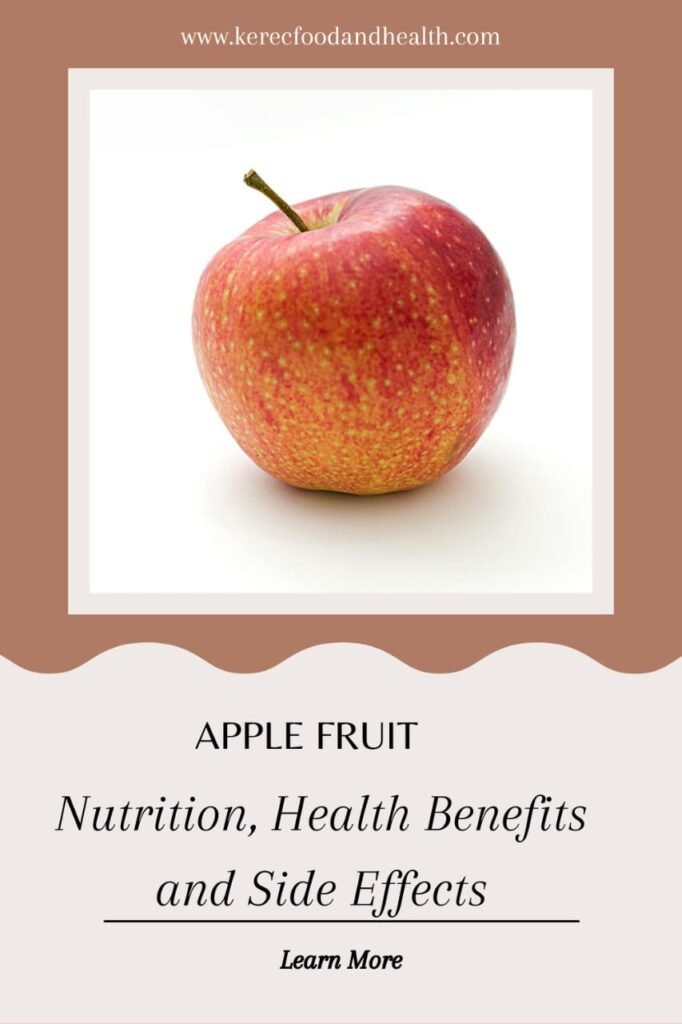
Nutritional Value of Apple
Apples are nutritious and provide a range of health benefits. According to USDA, 2019
| Raw Apple with Skin | |
| Serving Size | One Medium-sized (182 grams) |
| NUTRIENT | AMOUNT PER SERVING |
| Calories (kcal) | 95 |
| Water | 156 |
| Carbohydrates (g) | 25 |
| Dietary Fiber (g) | 4.4 |
| Sugars (g) | 19 |
| Cholesterol (mg) | 0 |
| Fat | 0.3 |
| Protein (g) | 0.52 |
| VITAMINS | |
| Vitamin A, Retinol (IU) | 98 |
| Vitamin C, Ascorbic acid (mg) | 9.2 |
| Vitamin E, alpha tocopherol (mg) | 0.33 |
| Vitamin B1, Thiamin (mg) | 0.031 |
| Vitamin B2, Riboflavin (mg) | 0.047 |
| Vitamin B6, (mg) | 6 |
| Choline, (mg) | 6.2 |
| Folate, (mcg) | 5 |
| Vitamin K, Phylloquinin (mcg) | 5 |
| Niacin (mg) | 0.166 |
| MINERALS | |
| Calcium (mg) | 12 |
| Magnesium (mg) | 10 |
| Phosphorus (mg) | 20 |
| Potassium (mg) | 214 |
| Iron (mg) | 0.24 |
| Sodium (mg) | 2 |
| Zinc (mg) | 0.07 |
| Copper (mg) | 0.049 |
| PHYTOCHEMICALS | |
| Carotene, beta (mcg) | 49 |
| Cryptoxanthin, beta (mcg) | 20 |
| Lutein + zeaxanthin (mcg) | 53 |
Apples are also rich in other antioxidants such as flavonoids like quercetin, catechin, epicatechin, procyanidin, cyanidin, coumaric acid, chlorogenic acid, gallic acid, and phloridzin, which may have potential health benefits. The dietary fiber in apples, particularly soluble fiber, can aid in digestion and help maintain a healthy gut. Remember that nutritional values can vary slightly based on the type of apple and its size.
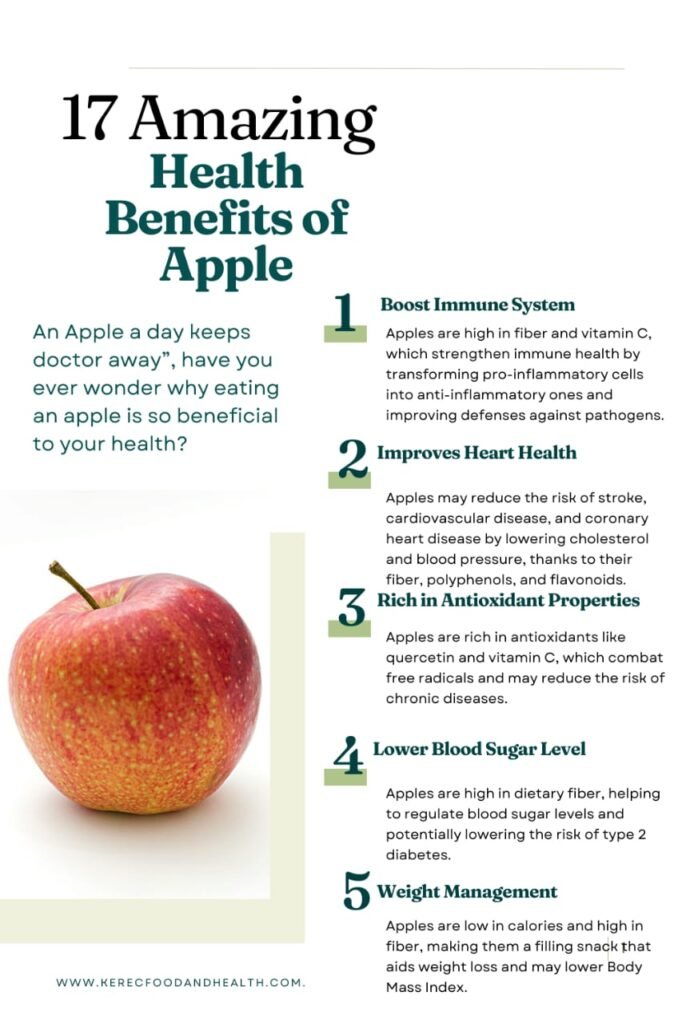
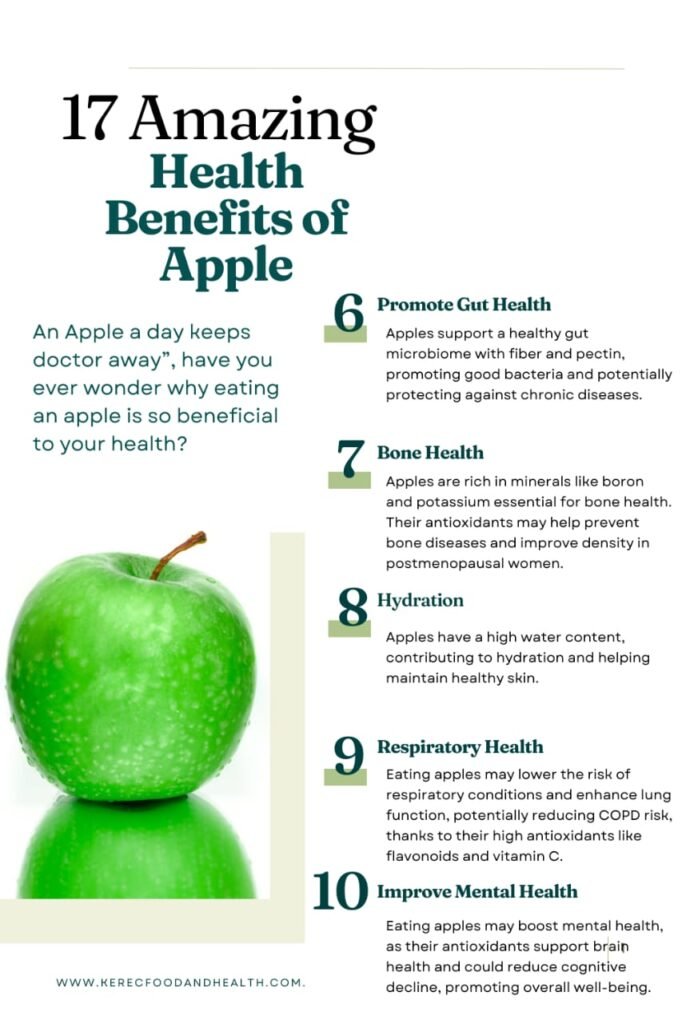
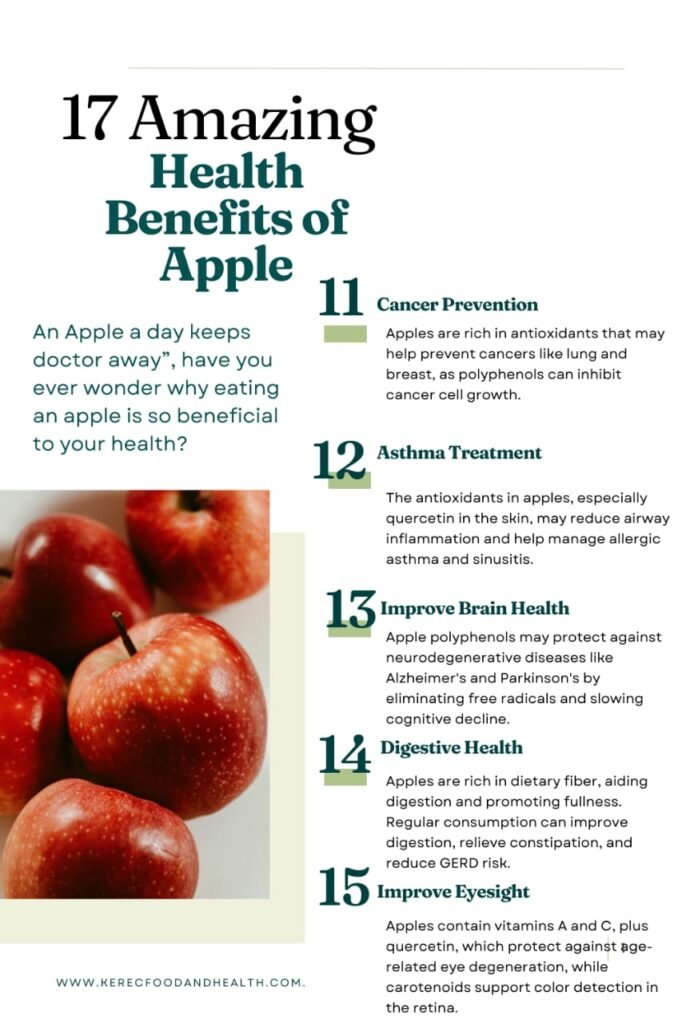
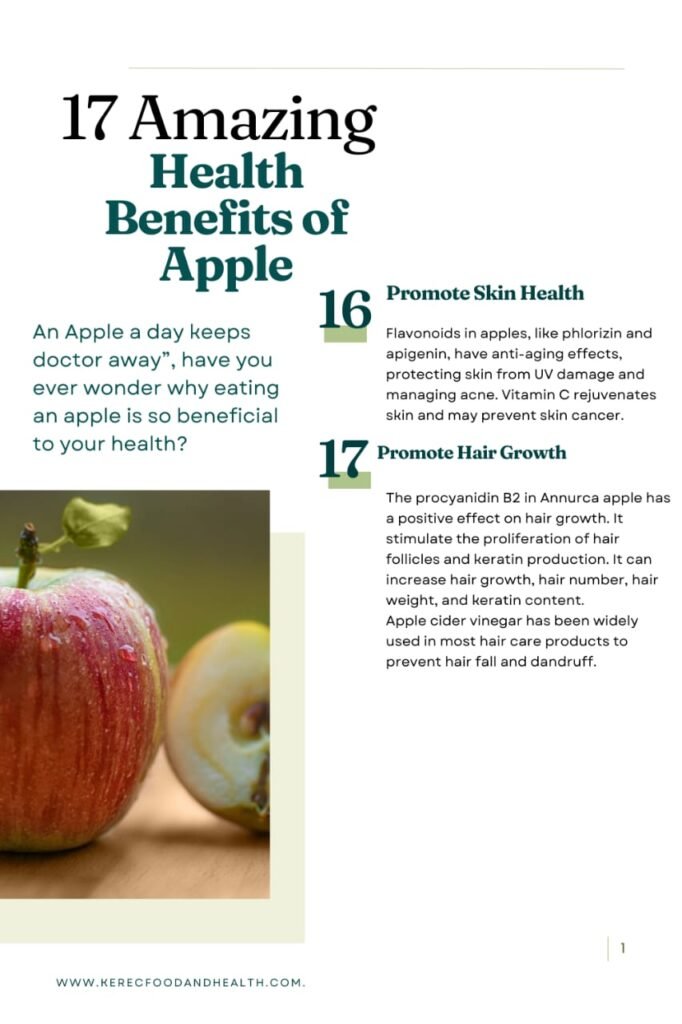
18 Amazing Health Benefits of Apple
It turns out there may be some truth to the age old saying, “An Apple a day keeps doctor away”, have you ever wonder why eating an apple is so beneficial to your health? This is because apples are loaded with nutrients, fiber, and antioxidants, that can offer several health benefits ranging from improving gut health to preventing chronic diseases. Here are some potential health benefits associated with consuming apples:
1. Boost Immune System
Apple are rich source of fiber, vitamins, and minerals, all of which boost the immune health. The soluble fibers in apple helped convert immune cells that were pro-inflammatory into anti-inflammatory and immune-supporting ones.
Apples contain immune-boosting vitamin C. Regular consumption of vitamin C plays many roles in helping the immune system function.
The Vitamin C in apples can help to strengthen the epithelial barrier against pathogens and guard against environmental oxidative stress, such as pollution and radiation.
2. Heart Health
Apple have been associated with a lower chance of heart disease and their risk factors such as high blood pressure, stroke and heart attack. They contain many nutrients that may lower the risk of stroke, cardiovascular disease, and coronary heart disease.
The soluble fiber in apples, such as pectin, may help lower cholesterol levels and reduce the risk of heart disease.
The polyphenols and flavonoids anti-oxidants in apple may help lower high blood pressure and chance of stroke.
3. Antioxidant Properties
Apples are a rich source of phytochemicals, such as quercetin, catechin, phloridzin and chlorogenic acid, all of which are powerful antioxidants.
These antioxidants in apple break down and neutralizes harmful free radicals in the body. Free radicals are reactive molecules that can build up as a result of exposure to UV light, polluted air and environmental factors.
Oxidative stress which can lead to cell damage could occur, if too many free radicals accumulate in the body system. Cell damage can contribute to a range of conditions like cancer, heart disease and diabetes.
Apple contain antioxidants like vitamin C that may help protect cells from oxidative damage, potentially reducing the risk of chronic diseases.
Incorporating antioxidant rich foods like apples, in your daily diets, can ward off the free radicals that build up to promote better health.
4. Blood Sugar Regulation
Apples are a good source of dietary fiber, which can help regulate blood sugar levels.
The fiber in apples can slow down the digestion of carbohydrates and help stabilize blood sugar levels, making them a good choice for managing diabetes.
Regular consumption apple may also reduce your chance of type 2 diabetes. This could be due to the high amount of polyphenol quercetin in apples.
5. Weight Management
Apples are low in calories and high in fiber, making them filling, satisfying and nutritious snack that can aid in weight loss or weight management.
Eating the whole apple will increase fullness more than consuming equal amounts of apple juice. Regular consumption of apple may significantly reduce Body Mass Index
6. Promote Gut Health
The fiber and natural compounds in apple can support a healthy gut microbiome, promoting beneficial gut bacteria and overall digestive health.
Apples are rich in pectin, a type of dietary fiber that acts as a prebiotic in the gut microbiome.
Since the dietary fiber in apple cannot be digested, pectin will reach your colon intact, thereby, promoting the growth of good bacteria.
Apple also improves the ratio of Bacteriodetes to Firmicutes, the two main types of bacteria in your gut.
Apples may also help protect against chronic diseases like obesity, type 2 diabetes, heart disease, and cancer.
7. Bone Health
Apples are excellent sources of minerals like boron, potassium, calcium, and fair amounts of zinc, which are very vital for bone health. Apples contain small amounts of bone-strengthening nutrients like calcium and vitamin K.
The antioxidants in apples can prevent osteoarthritis, osteoporosis, and other bone diseases.
The unique bone-building phloridzin phytochemical in apple can help improve bone density and reduce bone breakdown for women after menopause.
8. Hydration
Apples have a high-water content, contributing to hydration and helping maintain healthy skin.
9. Respiratory Health
Some studies suggest that the consumption of apple and their flavonoids may be linked to a reduced risk of certain respiratory conditions.
Regularly consumption of apple may help promote lung function and a reduced risk of developing COPD. This may be due to the high concentration of antioxidants like flavonoids and vitamin C in apple.
10. Improve Mental Health
Eating more apples may help to improve your mental health. Antioxidants in apple may have a positive impact on brain health and potentially reduce the risk of cognitive decline.
Research has revealed that people who consume fewer vegetables and fruit in their diet tend to have poorer mental health while those who consume more vegetables and fruit may have a positive impact on their mental health as it resulted to increase in good mental health.
11. Cancer Prevention
Apples are excellent source of antioxidants that may offer beneficial effects against certain types of cancers such as lung, breast, and digestive tract cancers.
Research has revealed that apple polyphenols can keep cancerous cells from multiplying. Regular consumption of apple can lower your chance of cancer death.
12. Asthma Treatment
The high amount of antioxidant in apple may help reduce airway inflammation related to allergic asthma.
The skin of apple is rich in quercetin antioxidant, which can help regulate the immune system and reduce inflammation.
Quercetin can be effective against late phases of bronchial asthma responses. Quercetin can help with allergic inflammatory diseases like asthma and sinusitis.
13. Brain Health
Apple polyphenols protect the brain from neurodegenerative diseases like Alzheimer’s and Parkinson’s and age-related memory loss.
Polyphenols eliminates free radicals from the body, thereby slowing down cognitive decline. Therefore, people who ate more fruits like apple had better cognitive function.
Apples are considered as one of the flavonoid-rich foods. Food rich in flavonoid like apples are less likely to develop Alzheimer’s disease and related types of dementia.
The high levels of quercetin in apple skin may protect your brain from damage that are caused by oxidative stress. Quercetin may also help prevent the development of Alzheimer’s disease.
15. Digestive Health
Apples are a good source of dietary fiber, which can help improve digestion and promote a feeling of fullness.
Regular consumption of apples may help food to digest better, help with constipation, and reduce the chance of getting gastroesophageal reflux disease (GERD).
16. Improve Eye Health
Apple contains vitamins A, vitamins C, and quercetin which protect the eyes from age-related degeneration and other eye infections.
Carotenoids like lutein and zeaxanthin in apple are vital for color detection in the retina.
17. Reduce Acne and Treat Aging Skin
The flavonoids like phlorizin, apigenin, silymarin, and genistein in apple fruits have anti-aging effects on the skin.
They protect your skin from the sun and the UV ray-induced inflammation and dark/white spots. They also control the secretion of sebum and can also manage acne vulgarisi.
The vitamin C in apple rejuvenates your skin with powerful antioxidant effects, which may improve skin health. Topical and oral application of vitamin C-rich apples will hydrate your skin and prevent skin cancers.
18 Promote Hair Growth
The procyanidin B2 in Annurca apple has a positive effect on hair growth. It stimulates the proliferation of hair follicles and keratin production. It can increase hair growth, hair number, hair weight, and keratin content.
Apple cider vinegar has been widely used in most hair care products to prevent hair fall and dandruff.
In Conclusion: It’s important to note that while apples offer these potential benefits, they are just one part of a balanced diet. Incorporating a variety of fruits, vegetables, whole grains, lean proteins, and healthy fats is essential for overall health and well-being.
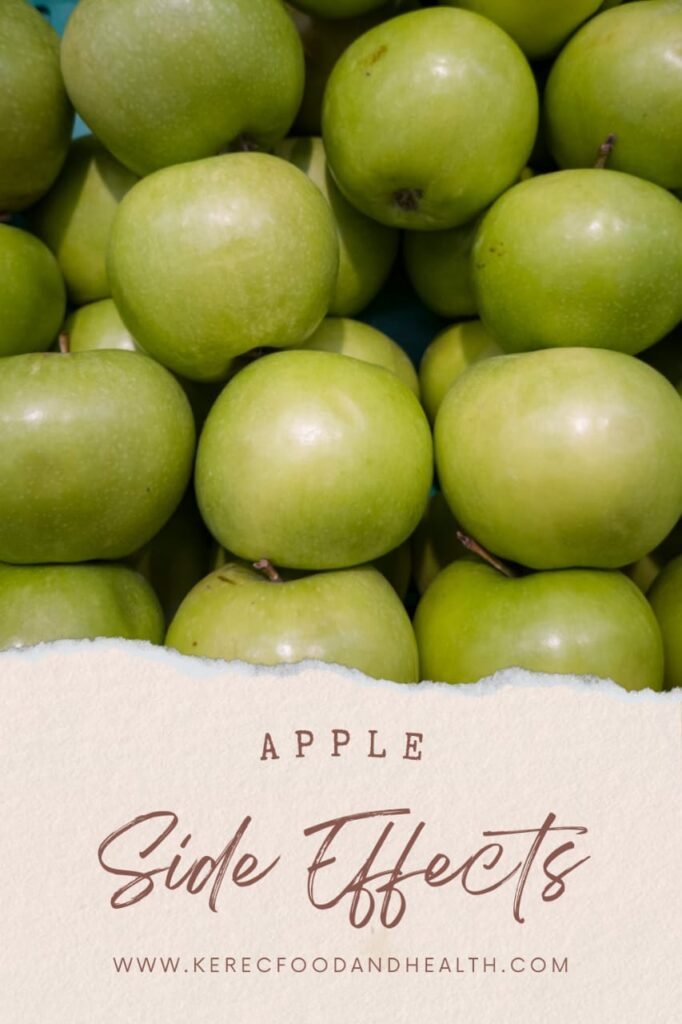
7 Possible Side Effects of Eating Too Many Apple
While apples are generally safe and beneficial to health, there are a few considerations and potential side effects to keep in mind when eating too many of it:
- Allergies: Some individuals may have an allergic reaction to apples, which can manifest as itching, swelling, or hives. This is relatively rare but can occur.
- Pesticide Residues: Conventionally grown apples can sometimes have pesticide residues on their skin. To minimize this risk, consider washing or peeling the apple before eating.
- Sensitivity to FODMAPs: Apples contain natural sugars called FODMAPs (fermentable oligosaccharides, disaccharides, monosaccharides, and polyols), which can cause digestive discomfort in people with irritable bowel syndrome (IBS) or FODMAP sensitivity.
- Dental Health: Apples are acidic and can potentially weaken tooth enamel if consumed excessively. Rinsing your mouth with water after eating apples can help mitigate this effect.
- Cyanide in Seeds: Apple seeds contain a small amount of a compound called amygdalin, which can release cyanide when broken down. However, you would need to consume a large number of apple seeds to be at risk. Simply avoiding eating the seeds eliminates this concern.
- Gastrointestinal Upset: Eating large quantities of apples in one sitting could potentially cause digestive discomfort due to the fiber content. Moderation is key.
- Interactions with Medications: Some compounds in apples, like polyphenols, can interact with certain medications. If you’re taking medications, consult your healthcare provider to ensure there are no interactions.
Remember that these side effects are generally mild and uncommon. Apples are considered a healthy and nutritious fruit for most people when consumed as part of a balanced diet. If you have any concerns or specific health conditions, it’s always a good idea to consult with a healthcare professional.
Source
- 10 Impressive Health Benefits of Apples, Amy Richter, Ariane Lang, and Kerri-Ann Jennings. June 27, 2023. https://www.healthline.com/nutrition/10-health-benefits-of-apples
- Apples 101: Nutrition Facts and Health Benefits. Marie Lorraine Johnson and Atli Arnarson. July 12, 2023. https://www.healthline.com/nutrition/foods/apples
- What to know about apples. Jillian Kubala, Yvette Brazier and Karen Veazey. February 10, 2023. https://www.medicalnewstoday.com/articles/267290
- 8 Outstanding Health Benefits of Apples. Leslie Barrie and Kelly Kennedy. August 24, 2022. https://www.everydayhealth.com/diet-nutrition/impressive-health-benefits-of-apples/
- Apples. WebMD Editorial Contributors and Zilpah Sheikh. July 28, 2023. https://www.webmd.com/food-recipes/benefits-apples.
- 5 Health Benefits of Apples. Laurie Herr and Jessica Ball. January 26, 2023. https://www.eatingwell.com/article/17769/5-health-benefits-of-an-apple/.
- 10 Reasons Why You Should Eat an Apple a Day. Shari Steinbach. https://www.michiganapples.com/healthy-living/healthy-living-blog/10-reasons-why-you-should-eat-an-apple-a-day/.
- 8 Surprising Health Benefits Of Eating An Apple Every Day. Madhu Sharma and Swathi Handoo. Jul 7, 2023. https://www.stylecraze.com/articles/top-10-health-benefits-of-apples/
- 8 surprising benefits of eating apples, including improving gut health. Ashley Laderer and Samantha Crozier. https://www.insider.com/guides/health/diet-nutrition/benefits-of-apples.
- USDA, 2019. Apples, raw, with skin (Includes foods for USDA’s Food Distribution Program) https://fdc.nal.usda.gov/fdc-app.html#/food-details/171688/nutrients
- 6 Possible Side Effects Of Eating Too Many Apples. https://timesofindia.indiatimes.com/life-style/health-fitness/diet/6-possible-side-effects-of-eating-too-many-apples/amp_etphotostory/80363064.cms
- Surprising Side Effects of Eating Apples. https://chelanranch.com/blogs/news/surprising-side-effects-of-eating-apples?srsltid=AfmBOoov_tKk5fTlHmdZ1oyMKhFqnsJog8DxXYR6jkb843W-DQfOlDXd
- USDA, 2019. https://fdc.nal.usda.gov/fdc


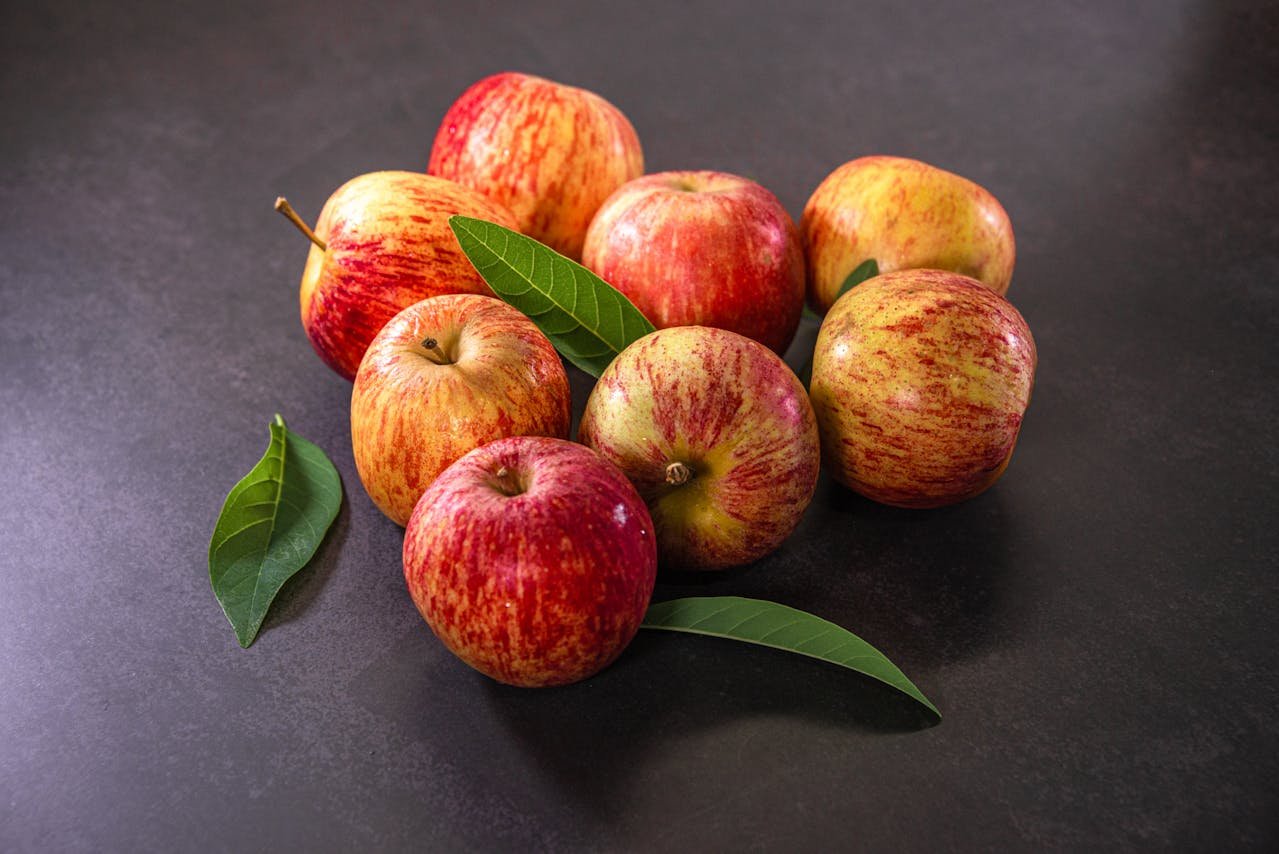


Pingback: Bilberry Nutrition, Health Benefits, and Side Effects